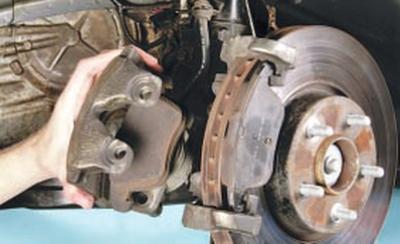Brake pads need to be replaced when the pads are worn (the minimum allowable thickness of the friction linings is 2.0 mm), loose connection of linings with the base, oiling of working surfaces, as well as in the presence of deep grooves or chips.
WARNING: Replace the brake pads of the front brake mechanisms only in a set - 4 pcs. (two on each side).
Before replacing the brake pads, check the brake fluid level in the master cylinder reservoir. If the level is close to the "MAX" mark, it is necessary to pump out part of the liquid (for example, a medical syringe or a rubber bulb), because after replacing worn pads with new ones, the level will rise.
You will need: 7 hex wrench, wheel nut wrench, large screwdriver.
1. Loosen the left front wheel nuts, place wheel chocks under the rear wheels ("shoes").
Raise the front of the vehicle with a jack, secure it on jack stands and remove the left front wheel.

2. Slide forward the spring retainer of the outer pad in the holes of the caliper..

3….and remove the retainer.

4. Prying off the cover of the protective sleeve of the lower guide pin with a screwdriver..

5….remove the cover.

6. Turn out the bottom directing finger..

7.... and remove it from the hole in the guide shoe.
8. Unscrew and remove the second guide pin in the same way.

9. Remove the caliper together with the inner brake shoe from the shoe guide, making sure that the brake hose is not stretched or twisted..

10.... and remove the inner brake shoe, removing its spring retainer from the piston cavity.

11. Remove the outer block, removing it from the grooves of the guide.

NOTE: Pay attention to the markings on the brake pads. Buy new pads with the same markings.
12. Examine a spring clamp of an external block, replace strongly deformed or corroded clamp.

13. Drown the piston of the working cylinder with the help of sliding pliers.
USEFUL ADVICE: Whenever you replace the brake pads, be sure to check the condition of the protective plastic bushings of the guide pins, as well as the movement of the caliper relative to the brake pad guide. If movement is difficult, lubricate the caliper guide pins with grease.
If the guide pin guards are damaged or their covers do not lock into the bushing holes, replace the guards.
14. Install the front brake pads in the reverse order of removal. To prevent self-loosening of the caliper guide pins, lubricate their threads before installing with an anaerobic thread locker.
15. Press the brake pedal several times to bring the brake pads to the disc.
16. Install the wheel.
17. Similarly replace the brake shoes of the brake mechanism of the right wheel.
18. Check up and if necessary restore level of a brake liquid in a tank of the main brake cylinder.
USEFUL ADVICE: After replacing worn out brake pads with new ones, do not rush to immediately go to busy highways. It is possible that at the very first intensive braking you will be unpleasantly surprised by the low efficiency of the brakes, although the pads were branded. Brake discs also wear out, and new pads only touch them at the edges, with little to no braking.
Choose a quiet street or passage without cars and slow down gently several times so that the pads get used and begin to fit the entire surface. At the same time, evaluate the effectiveness of the brakes.
Try not to brake sharply for at least the first 100 km. With strong heating of unused pads, the top layer of their linings burns and the brakes will not be as effective as possible for a long time.
Visitor comments